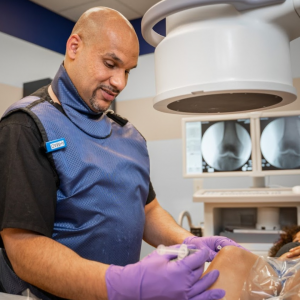What’s the Best Treatment for Plantar Fasciitis? Your Charlotte Physiatrist Weighs In

Have you ever woken up and felt a piercing pain in the base of your foot as you stepped out of bed? That’s how sneaky plantar fasciitis can be. You often get relief from the pain as you walk around. However, the pain returns after you finish your morning jog or have been on your feet for a while.
Plantar fasciitis is throbbing pain that can make anyone uncomfortable and hinder them from standing or carrying on with their usual activities. So, if you’ve been searching for the best treatments for plantar fasciitis in Charlotte, NC or Fort Mill, SC, you have come to the right place.
Our physiatrist in Charlotte, Dr. Usman Ahmad, has listed some effective non-surgical treatments for plantar fasciitis in this guide. Read on to learn more about the causes of your plantar fasciitis and the possible ways you can treat it.
What is Plantar Fasciitis?
Plantar fasciitis is simply the inflammation of the plantar fascia in your foot. It is the most common reason for discomfort in your heel, which is why many people with plantar fasciitis search for a heel specialist to help treat and relieve the pains in their feet.
The plantar fascia, which connects your heel to the ball of your foot and your toes, is a powerful, fibrous attachment (like a ligament). It has a stretchiness similar to that of a strong rubber band. The plantar fasciitis joins the bones in your foot together and forms your foot’s arch.
When your plantar fascia is overworked or overextended, plantar fasciitis develops. Your plantar fascia may swell as a result of an injury. Walking and using your foot becomes painful due to this inflammation, so knowing how to treat plantar fasciitis is essential.
Plantar fasciitis often affects one foot at a time, but it can also strike both of your feet at once. If you have foot or heel discomfort that has persisted for over a week, and you are searching for the best plantar fasciitis doctor in Charlotte who can help treat it, visit us at Advanced Sports and Spine, and let’s help you cure your foot pain.
What Causes Plantar Fasciitis?
Plantar fasciitis can be caused by anything that irritates or harms your fascia. You may develop plantar fasciitis if:
- Your work requires that you stand for long periods
- You engage in sports
- You wear shoes that don’t support your feet well (such as flip-flops or flat sneakers)
- You exercise without warming up or stretching
- You work-out or exercise on a hard surface (such as a sidewalk or a warehouse floor)
- You occasionally walk or stand barefoot when you’re at home.
Some health issues can also result in plantar fasciitis; they include:
- Flat feet
- High arching feet
- Obesity
Symptoms of Plantar Fasciitis
The most common symptoms of plantar fasciitis include:
- Pains in your foot arch
- A tight Achilles tendon
- Heel pain
- Swelling around your heel
- Stiffness
If you’re experiencing any of these symptoms that don’t wear off in a few weeks, find a plantar fasciitis specialist in Charlotte to help treat your feet.
What Are Some Non-surgical Treatment Options for Plantar Fasciitis?
Managing plantar fasciitis using over-the-counter (OTC) medicine and at-home treatments is easy. However, our physiatrist in Charlotte, Dr. Ahmad, can suggest some effective non-surgical treatment options for plantar fasciitis. These treatments will quickly relieve your symptoms and reduce the chances of experiencing plantar fasciitis again.
The common plantar fasciitis treatments include:
1. NSAIDs
Pain and inflammation are reduced by NSAIDs, which include aspirin, ibuprofen, and naproxen. They can be applied topically or orally to treat foot discomfort. However, it’s important to note that you should never take NSAIDs for more than 10 days without consulting a plantar fasciitis specialist.
2. PRP Therapy
Platelet-rich plasma (PRP) therapy may better manage your plantar fasciitis. Dr. Ahmad uses PRP therapy in Charlotte as an effective non-surgical treatment for plantar fasciitis by extracting a tiny amount of blood for the PRP procedure. The extracted blood will then be spun in a powerful centrifuge to separate the platelets from the other components of the blood. The platelet-rich plasma is then injected into the area that needs to heal.
3. Corticosteroid Injections
Corticosteroids are medicines physiatrists use to treat inflammation, such as plantar fasciitis. Your heel specialist may inject a corticosteroid (like prednisone) into your plantar fascia. Your body’s adrenal glands naturally release the cortisone hormone in response to stress, allergic reactions, and inflammation.
To treat inflammation in particular body areas, such as the heels, cortisone injections use a synthetic version of natural cortisone (also known as a corticosteroid). It can be helpful to see cortisone injections as a highly concentrated, tailored version of ibuprofen or Tylenol.
How Long Does Plantar Fasciitis Last?
As soon as you begin your plantar fasciitis treatment in Charlotte, you should notice an improvement in your symptoms. However, the time it takes for your plantar fascia to heal might range from weeks to months.
If you use NSAID medicines and you start to feel better, and then your symptoms return, or if the symptoms seem different or worse, you should consult a heel specialist in Charlotte. The specialist can prescribe the proper plantar fasciitis treatment for you.
Proven & Effective Non-surgical Treatment for Plantar Fasciitis in Charlotte, NC

The most typical reason for heel pain is plantar fasciitis. If you are experiencing foot or heel discomfort that doesn’t go away within a week, visit us at Advanced Sports & Spine. Our physiatrist, Dr. Ahmad, uses stem cell PRP therapy in Charlotte to quickly relieve your foot pain and reduce the chances of it occurring again.
We know how annoying it can be to miss a week (or more) of your preferred sport or hobby. However, when being treated for plantar fasciitis, don’t be in a hurry to get back onto the court or field. If you overstress your foot before it heals, you risk re-injuring your plantar fascia.
Schedule an appointment with the best plantar fasciitis doctor in Charlotte to get the best cure for plantar fasciitis and ensure that it doesn’t occur again.
Disclaimer: The benefits of regenerative medicine have not been reviewed or approved by the FDA.
